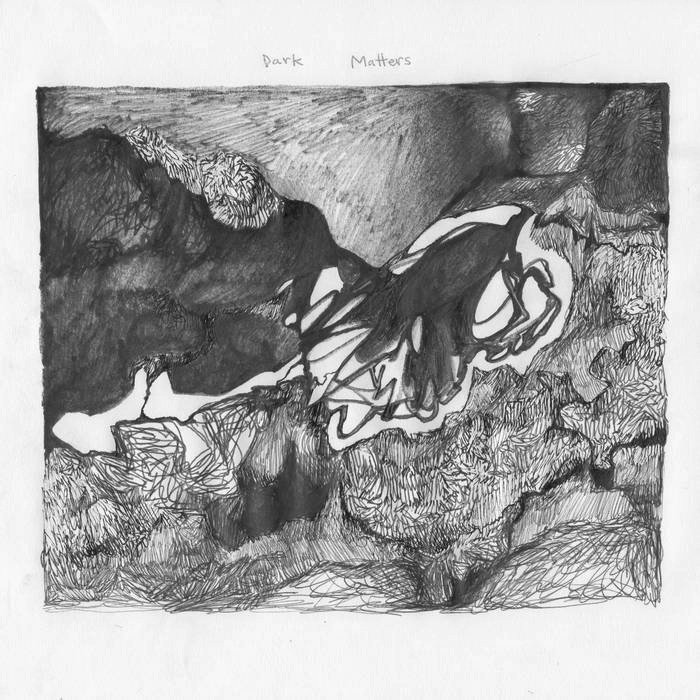Maneka: Dark Matter
Maneka: Dark Matter
Skeletal Lighting 3/11/2022
The only thing declared dead more often than rock n roll is the novel. But Maneka looks to write a new chapter with its latest LP Dark Matter. In ten songs the New York-based band deconstructs the genre, guided by frontman and composer Devin McKnight. The music grapples with social and political themes, couched in the personal vision of McKnight’s impressionistic lyrics. If racism in America is the zombified corpse that won’t die no matter how many times neo-liberals plunge the “post-racial” stake into its heart, then maybe an undead rock n roll is the perfect medium to genuinely acknowledge a history of oppression and its present day discontents. And toss in a few guitar solos for good measure.
The politics, though, are always personal. “Runaway” has the heart of an acoustic picker. You can imagine McKnight composing this one on a quiet Sunday afternoon. The production style focuses the listener’s attention on the lyrics. McKnight tells an oblique, impressionistic story about race in America that’s both personal and universal. It’s a story that’s been unfolding for “5 centuries.” And however many generations have passed since slavery was abolished, to be black in America is to be part of that history of oppression. A “runaway” is a slave that escaped slavery by dint of skill and luck, not because the practice of slavery was illegal. In theory, the concept of the “runaway” is committed to the dustbin of history at the abolition of slavery. But the feeling of being on the run, vulnerable, liable to be snatched up and thrust back into bondage at any moment, is impossible to shake.
On the other hand, sometimes the personal is just that – personal. On “Zipline”, Maneka delivers a subdued, medium-tempo rock romancer. The ‘zipline’ in question is a cupid’s arrow. Whether it’s aiming for lust, or love, or simply obsession, is unclear. There’s a narrative arc: a progression from “No one’s gonna stop me” to “They’re never gonna stop us” suggests a coupling has been accomplished. But of what sort? Between whom? The vocal tracks have a kind of drugged Ozzy Osbourne grind to them, as if the production was shot in the neck with a tranquilizer dart. The story told by the lyrics is ambiguous. The timbre of the modded vocals has an emotionally null quality that turns the protagonist into a cipher. An otherworldly flute intervention by Vivian McConnell underlines what remains unexplained.
The artist NNAMDÏ appears on two tracks: “Jazz with Nnamdi (The Brunch Special)” and “Jazz with Nnamdi (The Cocktail Hour)”. The collaboration makes for three or four minutes of incidental jazz, with Nnamdi Ogbonnaya on drums and McKnight (?) on keys. It’s an interesting diversion, maybe even a palate cleanser. If nothing else, it reminds the listener of the common ground between the two artists that shines on Dark Matter.
Within this common ground, though, let’s highlight at least two elements: a general philosophy of composition and a particular affinity for modded vocals.
The artists share what you might call the “collage” approach to composition, deconstructing the elements of genres and reassembling the pieces into novel 21st century constructs all their own. You hear this with NNAMDÏ from the more rough-and-ready Bootie Noir (2013) to his superlative Please Have A Seat (2022). Maneka strives for the same analytic-synthetic style, albeit more firmly planted within the rock n roll register. As for the modded vocals, the artists are participating in a much larger trend: the digestive capacity for vocal effects in the pop musical intestine has grown beyond all reasonable bounds. It’s not clear anymore that the production trick is adding artistic value. But when Maneka deploys the effect, at least you get the sense that the band is aiming for a particular mood rather than posting up sonic wallpaper willy nilly.
“Winner’s Circle” provides an example of Maneka’s “collage” style, mashing up heavier rock elements and drum machine stylings. There’s a significant tempo change after the midpoint of the song, a shift uptempo toward a more decisively guitar-driven sound. The song morphs from a light electronic trot into a galloping hard rock attack. The final line sounds like bravado: “In a sense I’m exactly where I’m meant to be in the center of this winner’s circle.” But it’s just one parting thought at the tail end of an inner dialogue about influence and intention, and the speaker doesn’t sound entirely convinced by the claim.
“The Glow Up” crafts art-damaged blues rock fed through a prog meat grinder. The raw bones of the song are primal guitar progressions. Shades of Kim Gordon – an off-kilter minimalism with lyrics that bite. The progressions are dressed up with vocal harmonies and synth washes, lifting the production into more aethereal heights by the time the protagonist draws his final conclusion: “The irony of this chain is // it's the one that make a nigga free.”
Maneka concludes Dark Matter with “Bluest Star”, a melodic, uptempo jammer with a sweet refrain. Unlike a more plodding track like “Maintain”, the final song of the album shows a light touch. It’s Maneka in its poppiest modality. Verse, chorus, catchy refrain, guitar solo – the pop-rock vernacular is all in place. McKnight is an artist who writes songs that avoid, or at least sidestep, the most tired genre conventions. He’s certainly not trying to craft the Platonic Ideal of rock songs. But on the last song of the album “Bluest Star” - a send-off? a kiss-off? – he gives in a bit to formula. The result is both satisfying and compelling. Maybe he should give in to formula more often?
Devin McKnight // ManekaThe sights of the album are set on loftier ambitions than mere entertainment. Sure, Maneka wants you to enjoy the ride, but it also wants Dark Matter to matter. To matter artistically: the songs on the album are probing, questioning, restlessly testing the limits of genre commonplaces. To matter culturally: Maneka enters into a social and political dialogue that is happening right now in America. To matter personally: the project is a realization of McKnight’s musical vision. The three-pronged attack of artistry, cultural commentary, and personality does not always fit together into one tidy package. At times the album sounds like a rock n roll Frankenstein, an assemblage of parts shot through with electricity, struggling to piece itself together. Like Mary Shelley’s monster, what we find most unsettling in the album is its humanity. Dark Matter is fractured along the same lines as our own cultural world. To engage with the meaning of the music is unsettling — but to ignore it is a privilege that we can no longer afford.




































